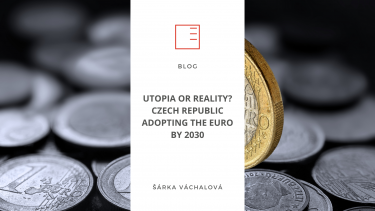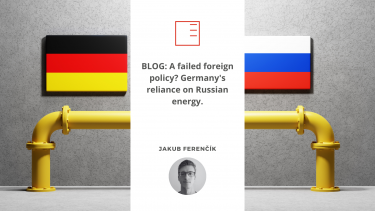BLOG | Climate, Energy and the Green Deal in the Czech Chain Mails
Tatiana Mindeková, our project manager and junior researcher, wrote a blog on the topic: Climate, Energy and the Green Deal in the Czech Chain Mails. What narratives are spread about the green politics of the EU in the Czech chain mails?
Show morePOLICY PAPER | Soaring electricity prices and development in the EU; the electricity market design under scrutiny?
As part of the internships provided by our Brussels office to Czech researchers, Tereza Stašáková wrote a policy paper on rising electricity prices and developments in the EU. It analyses the reasons for rising prices and how EU Member States have reacted to the situation. And whether the solution is to restructure the electricity market.
Show more PDFBlog | Business-as-usual between Germany and China as a disruptive element for the European Union
The war in Ukraine and the subsequent economic crisis caused by Europe's dependence on Russian fossil fuels showed Europeans the danger of keeping too tight economic ties to autocratic regimes. However, while Europe is shedding its dependence on Russia, another economic reliance is gaining strenght, namely that of Germany on China. In her blog, our intern Kristina Kropáčková explores the broader context of this phenomenon and its implications for EU cohesion.
Show moreBlog | US Midterms: Consequences for the security of Eastern Europe
The recent US midterm elections made headlines around the world. The main issues that voters were interested in were the state of democracy and the rule of law, abortion, the economy and education. Our intern Tomáš Moudrý addressed these topics in his blog. "The most expensive midterms in the US history are over. Republicans gained the House majority with 221 seats and the Democrats retained the Senate with 51 seats. Is this a surprising result? Partly yes, partly no. Firstly, polls and even Republicans were sure about a “Red wave“ that would sweep across the US. Instead, there was a tossup in both Chambers of the Congress. Secondly, the President’s party usually lose the midterms. One can argue that midterms from the incumbent President’s party perspective traditionally have just one major goal – to mitigate losses by the closest possible margin. The Democrats seem to have found a way to deal with this fate, despite Biden's low approval rating."
Show more PDFBlog | Utopia or reality? Czech Republic adopting the Euro by 2030
When will the Czech Republic be ready to adopt the euro, as it committed to when it joined the EU. Why do we not have the euro yet and what will be the impact of its adoption? Our intern Šárka Váchalová covered this topic in her blog.
Show more PDFBlog | European Media Freedom Act
In her blog, our intern Leonor Tavares focuses on the new European media freedom act. Independent media as a means of freedom of expression is under threat in some EU member states and is being used for political propaganda or is being shut down altogether. The new law should ensure that public service media provide a plurality of information in an impartial manner, while regulating their funding and the acquisition and protection of journalistic sources.
Show more PDFBlog | New Hope on the Horizon? The Belgrade-Pristina Dialogue and the European Union's Struggle Towards a Diplomatic Victory
In her blog, our intern Barbora Volkova discusses the new Franco-German proposal regarding the Kosovo-Serbia disputes. She analyses what this initiative entails and what relevance it may have for the accession negotiations within the European Union.
Show more PDFBlog | A drop of leftwing in a sea of rightwing? The Brazilian elections
As the world eagerly awaits the outcomes of Brazilian elections, which will have strong impacts on the future of the Amazon and global climate efforts, our intern, Benedetta Milani, breaks down the status quo as Brazil determines its political future tomorrow.
Show more PDFBLOG: A failed foreign policy? Germany's reliance on Russian energy.
Jakub Ferenčík has written a blog on German dependence on Russian gas. In his post he discusses how the German government's initially positive intention to tie Russia to Europe through economic intergation for political stability has backfired and resulted in the opposite. It mentions the role of former Chancellor Gerhard Schröder, who contributed significantly to Germany's dependence on Russian supplies, and the circumstances surrounding the construction of the Nord Stream 2 pipeline. The second part analyses the legacy of former Chancellor Merkel and her failure to perceive Russian expansionist tendencies.
Show more
BLOG | How do Czech and Slovak governmental parties perceive the EU's green deal? Online monitoring of Facebook posts
Tatiana Mindeková, our project manager and junior researcher, wrote a blog named “How do Czech and Slovak governmental parties perceive the EU Green Deal? Online monitoring of Facebook posts”. In this blog, Tatiana analysed approaches of Czech and Slovak parliamentary parties to the European Green Deal and identified whether the parties and their representatives are supportive or critical towards it.
Show more PDFStaroměstské náměstí 4/1
Prague 1 - Staré Město
110 00
tel.: +420 212 246 552
email: europeum@europeum.org
https://www.europeum.org









